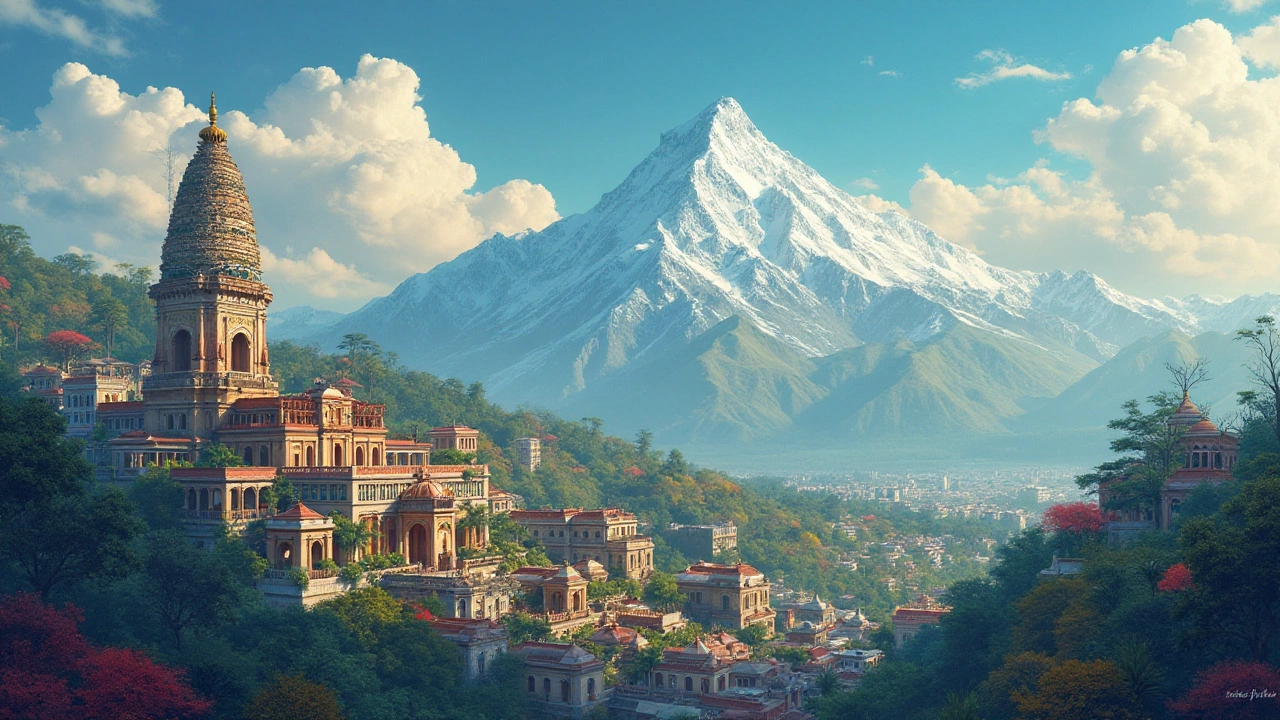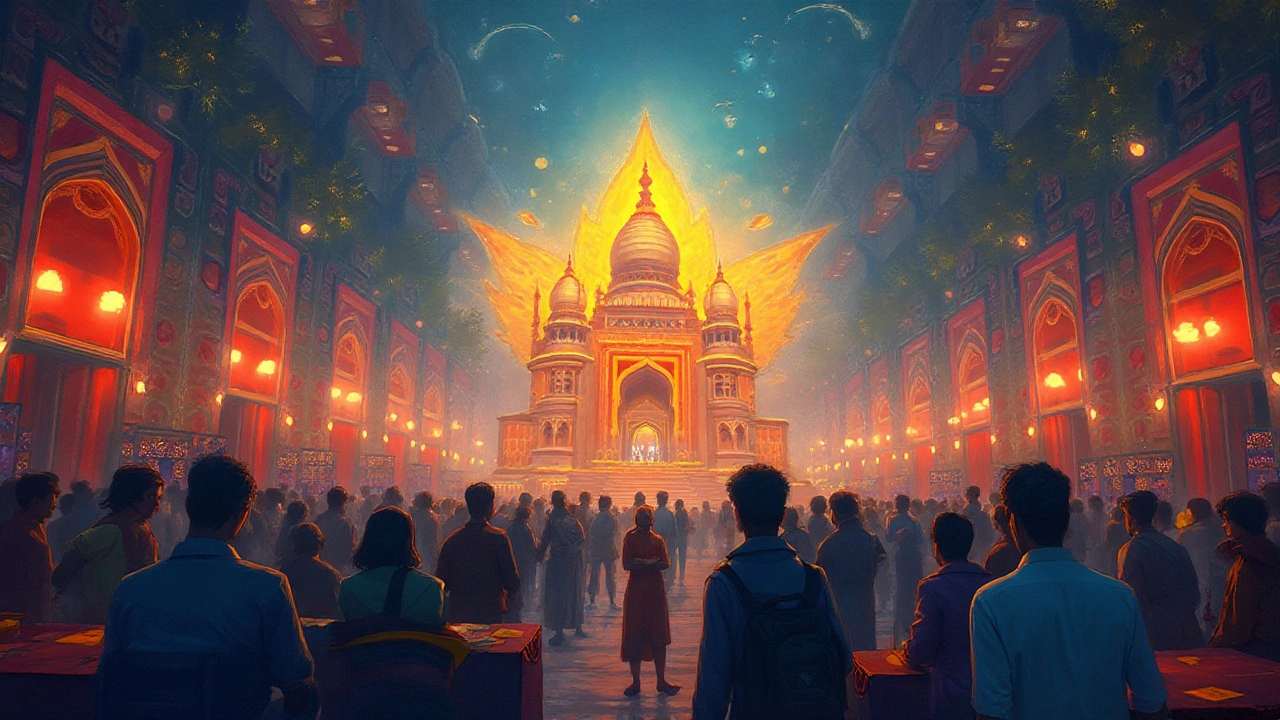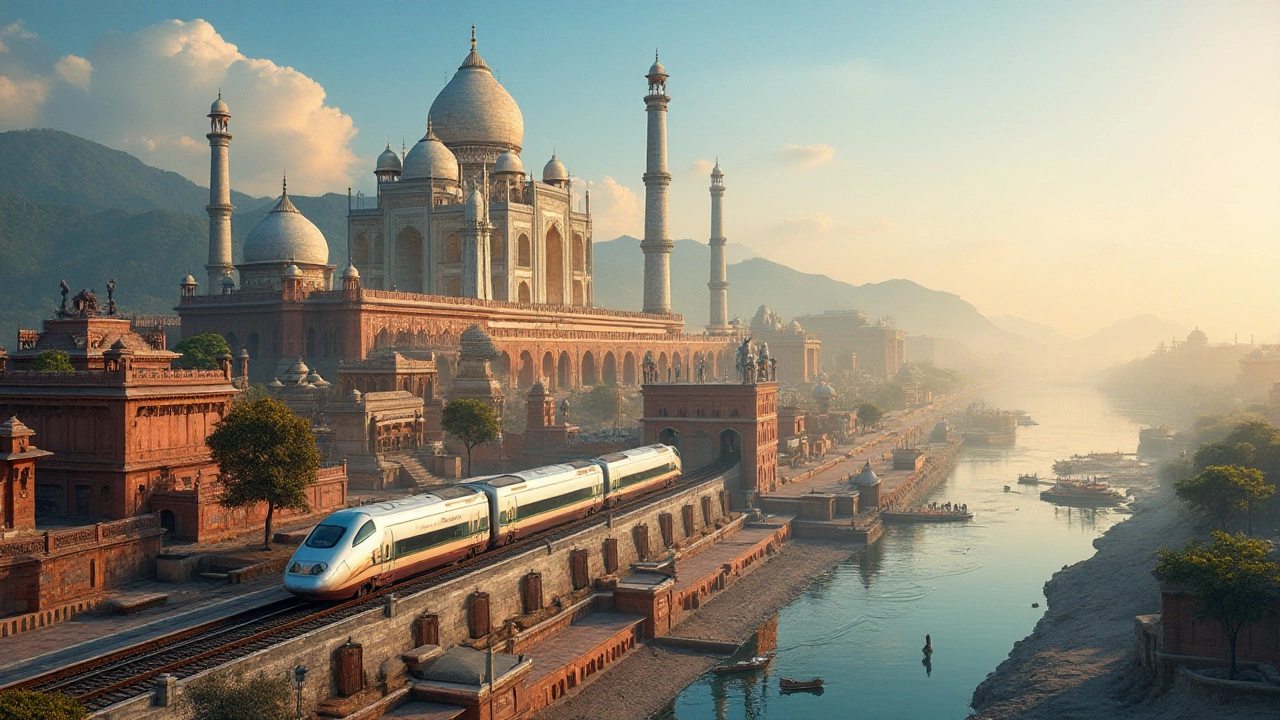Is India Poised to Become a Global Superpower? Exploring Spiritual Wisdom and Modern Might

India stands at a fascinating crossroads, where centuries-old spiritual wisdom meets rapidly advancing technological prowess. The question arises: Is India on the brink of becoming a global superpower? There's no denying the influence of its vast cultural and spiritual heritage, which continues to enlighten and inspire millions worldwide. But it's also the impressive strides in economic development and technology that draw widespread attention.
In a world looking for a blend of tradition and innovation, India presents a unique case. Its ancient spiritual teachings provide a resilient foundation that supports not only individual well-being but also communal harmony. These teachings are not just relics of the past; they are actively shaping how modern India positions itself on the global stage.
At the heart of this transformation is a vibrant economy, powered by technology and a youthful, ambitious population. Coupled with this dynamism is India's strategic positioning in international affairs, where it balances relationships with major powers while carving its own path. However, challenges remain, and navigating these will determine whether India can truly claim the mantle of a world superpower.
- The Spiritual Legacy of India
- Economic Progress and Technological Advancements
- Cultural Influence Globally
- India's Geopolitical Strategies
- Challenges on the Path to Superpower Status
The Spiritual Legacy of India
India's spiritual legacy is as vast as its geography, spanning countless traditions, beliefs, and philosophies, each contributing uniquely to what many consider the spiritual heart of the world. At the forefront of this legacy are the teachings of Hinduism, Buddhism, Jainism, and Sikhism, which emerged from the Indian subcontinent thousands of years ago. These traditions have shaped the lives of not just those within India, but have influenced spiritual thought and practice across the globe. The Vedas, ancient religious texts, and the Upanishads have been heralded for their insights into life, consciousness, and the universe itself.
"Truth is one; sages call it by different names." – Rig Veda
This single line encapsulates a cornerstone of Indian spirituality, reflecting a profound acknowledgment of unity in diversity. The Upanishads, often revered for their philosophical depth, introduce grand ideas about the interconnectedness of all beings, ideas that resonate with the global call for environmental sustainability and peace. The Bhagavad Gita, another seminal text, doesn’t just explore dharma, or duty, but provides timeless wisdom on mental clarity and determination, qualities essential for personal growth and leadership.
India's spiritual wisdom is not confined to ancient texts alone. It is alive and evolving, seen in practices such as yoga and meditation, which have become integral to wellness regimes worldwide. The art of meditation fosters mindfulness, aiding millions in navigating stress and finding balance in a chaotic world. Yoga, often mistaken simply for physical exercise, is truly a holistic path that promotes physical, mental, and spiritual well-being, thereby engaging various facets of human existence. The global embrace of these practices cements India's influence in everyday life far beyond its borders.
The landscape of spiritual India is dotted with pilgrimages and holy sites, each with a story and a teaching of its own. Varanasi, one of the world’s oldest cities, holds immense significance as a place of learning and spirituality. It attracts seekers from every corner of the world, intrigued by its aura of devotion and mysticism. Similarly, Bodh Gaya, the site where the Buddha attained enlightenment, offers inspiration through its enduring silence and beauty. These sites, apart from their historical significance, are ongoing reminders of India's continuous journey in spiritual exploration and enlightenment.
India's spiritual wisdom subtly intertwines with its modern narrative, showing that ancient teachings can coexist with, and even enhance, contemporary advancements. This spiritual heritage not only empowers individuals by providing tools for introspection and personal growth but also fosters a sense of collective responsibility towards humanity and the planet. Thus, India's spirituality becomes a tapestry for a world that seeks both material success and profound understanding. In this harmonious balance, India finds not only its voice but its potential path to becoming a world superpower, gracefully combining the old with the new.
Economic Progress and Technological Advancements
India's economic journey is nothing short of remarkable, mirroring its aspiration to become a global force to reckon with. The country's GDP has seen a commendable rise, showcasing a robust annual growth rate that consistently places it among the world's fastest-growing economies. This progress isn't just a stroke of luck. It is the result of strategic economic reforms, investments in infrastructure, and a burgeoning start-up ecosystem. India’s economic policies have been aimed at bolstering local industries while also inviting foreign direct investments, which have proven to be a cornerstone of its economic strategy.
The transformation is palpable, especially in urban centers that buzz with entrepreneurial activity and innovation. Cities like Bengaluru and Hyderabad have become synonymous with technological hubs, often referred to as the Silicon Valley of India. This growth is powered by a young and dynamic workforce, educated and ready to meet the challenges of the 21st century. The Indian tech industry, particularly the IT services sector, has not only fueled economic growth domestically but has also become a critical backbone for many global companies. Household names from the West rely heavily on Indian IT expertise, reinforcing India’s crucial role in the global technology landscape.
The tech boom is complemented by leaps in sectors like manufacturing, which has gained momentum under initiatives such as 'Make in India,' aimed at making the nation a global manufacturing hub. This initiative encourages local and international companies to manufacture their products in India, boosting job creation and skill development. Additionally, India is fast-tracking its shift towards a digital economy with policies that encourage digital payments and smart solutions. The government’s push towards financial inclusion through technology-driven banking initiatives continues to bear fruit.
Another significant advancement is the rise of India's space technology leadership. The Indian Space Research Organisation (ISRO) has showcased its capability through cost-effective and innovative missions, including the Mars Orbiter Mission, which placed India among the elite group of spacefaring nations. Such accomplishments serve not just as a matter of national pride but also as a testament to India's growing clout in science and technology.
"India is a beacon of innovation in the 21st century, proving that with the right mix of talent and perseverance, anything is possible," remarked Sundar Pichai, CEO of Google, highlighting the crucial role Indian ingenuity plays on the world stage.
These technological advancements are evident in daily life, with tech startups creating solutions that cater to the unique Indian market, from fintech to healthtech. E-commerce giants such as Flipkart and global players like Amazon find fertile ground here due to the rapid digital adoption among the populace. These developments lay the foundation for India’s inevitable rise as a global superpower, driven by technological advancements and economic progress intertwined with its spiritual heritage.

Cultural Influence Globally
India's cultural influence worldwide is a vibrant tapestry woven with threads of art, history, philosophy, and spirituality. This influence is not a new phenomenon but has been evolving over centuries as India opened its riches of spiritual wisdom and cultural variety to the world. Today, the country's cultural footprint can be seen in a myriad of aspects, from the ways yoga and Ayurveda enrich lives globally, to the profound philosophical concepts rooted in Indian tradition that shape modern thinking. It is fascinating how Indian cinema, especially the colorful landscape of Bollywood, has captivated audiences beyond its borders, creating a universal language of storytelling. These films often provide a window into the diverse socio-cultural ethos of India, inviting people from different backgrounds to engage with its stories and traditions.
Music and dance are also integral elements of India's cultural arsenal, with classical forms like Bharatanatyam and Kathak and musical traditions such as Hindustani and Carnatic music gaining followers worldwide. The fusion of these ancient styles with contemporary genres illustrates a dynamic cultural exchange that enriches both global and Indian audiences. Festivals like Diwali and Holi are celebrated with much enthusiasm around the world, symbolizing the joy and vibrancy that Indian culture brings to global communities. This exchange reflects a shift towards cultural openness and a deeper understanding between nations. Many universities now offer courses in Indian studies, further testament to India's cultural resonance. Such academic pursuits ensure that future generations continue to appreciate and propagate Indian cultural narratives.
"The Indian way of life provides the vision of a natural, real way of life. We veil ourselves in mysteries, in secrets, in superstitions, in fears, and in our so-called knowledge... Lord Krishna and the Gita also hold profound insights that are relevant to both personal and global consciousness." — Rabindranath Tagore
The Indian diaspora plays a pivotal role in amplifying the country's cultural influence globally. They act as cultural ambassadors who blend Indian traditions with local customs, creating a fusion that enriches both societies. This interaction often leads to a more inclusive perception of cultural diversity globally. In food, yoga, fashion, and beyond, Indian culture continues to inspire and adapt across continents. Governments and private entities are increasingly recognizing this influence, with initiatives aimed at promoting and preserving India's cultural heritage worldwide. Such efforts are crucial as they help maintain cultural integrity while also allowing for growth and evolution in a global context. As we voyage into the future, India's cultural influence stands as a testament to the enduring power of tradition and innovation. This influence not only enriches diverse cultural landscapes but also drives deeper connections, offering a shared sense of humanity and spiritual growth in this interconnected era.
India's Geopolitical Strategies
India's geopolitical strategies are a tapestry woven with threads of historical ties, modern diplomacy, and strategic foresight. As an emerging global superpower, India has been deftly maneuvering its place amid the complex dynamics of global politics. Historically, India has leveraged its non-aligned movement roots to maintain a balanced stance among varied international blocs. As it redefines its global role today, this strategy allows India to engage without entanglement with power centers such as the United States, Russia, and China.
Engagement with the United States has become a cornerstone in India's geopolitical playbook, especially in terms of economic and military collaboration. This partnership is punctuated by landmark agreements, such as the Defense Technology and Trade Initiative (DTTI), which promises shared defense production and innovation. Meanwhile, the Quad, an informal strategic forum involving the U.S., Japan, Australia, and India, aims to secure the Indo-Pacific region—where 50% of global trade transits—strengthening India's influence.
"In our quest to make 21st century the century of Asia, India remains committed to continue working closely with its friends," says Indian Prime Minister Narendra Modi. This underscores the country's strategic vision.
India's initiative to strengthen ties with neighboring countries illustrates its intent to foster regional stability that supports strong economic growth. Initiatives like 'Neighborhood First' emphasize enhancing connectivity and economic integration with Bangladesh, Bhutan, Nepal, and Sri Lanka. The country is also investing in long-term relations through infrastructure projects and diplomatic dialogues to overcome historical disputes and ensure a peaceful South Asia.
On another front, India extends its reach into Africa, Latin America, and Southeast Asia through diplomatic missions and economic investments. This wide-reaching approach enables India to tap into diverse energy resources and emerging markets. Its collaboration with African nations, in particular, highlights a concerted effort to promote economic progress and mutual growth. India-Africa summits pave the path for a new era of development partnership, characterized by information technology, pharmaceuticals, and agricultural initiatives.
Furthermore, the strategic maritime routes in the Indian Ocean are indispensable for India's security and trade aspirations. Initiatives like the International Solar Alliance and Project Sagarmala, which focus on port modernization, epitomize India's proactive stance in asserting its maritime influence. A visible indicator of this strategy is the modernization of its navy, with an emphasis on indigenous shipbuilding, enhancing India's maritime capability to safeguard its interests in open seas.
To navigate the challenges on its path to becoming a world superpower, India must continuously refine its geopolitical strategies. Balancing defense needs with economic priorities, maintaining relationships while asserting sovereignty, and promoting peace while strategically engaging are essential to its ambitions. With its blend of dynamic diplomacy and strategic acumen, India's rise on the global stage reflects a nuanced approach, marking its journey towards an influential force in the contemporary world order.

Challenges on the Path to Superpower Status
As India marches towards the prospect of becoming a global superpower, it faces an array of challenges that are as significant as its aspirations. One of the foremost challenges is poverty. Despite impressive economic growth, a substantial segment of the population still struggles with poverty, lacking access to basic amenities such as clean water, healthcare, and education. Addressing these disparities requires comprehensive policy reforms and sustained efforts at both the national and local levels. Alongside economic growth, ensuring equitable resource distribution remains a pivotal goal.
Another challenge India faces is infrastructural development. While the nation has seen rapid urbanization, this has often outpaced the available infrastructure, leading to traffic congestion, pollution, and inadequate housing in major cities. Investing in smart city projects and expanding public transportation can help alleviate these issues, promoting a more sustainable urban environment. Moreover, rural areas need better connectivity and infrastructure to ensure balanced economic development across the country.
Social harmony is another critical aspect, as India is home to a diverse population with myriad languages, religions, and cultures. Fostering a sense of unity among this diversity without compromising individual cultural identities is vital. Instances of social unrest, often fueled by political agendas, pose a risk to national cohesion and must be addressed through inclusive policies and dialogues.
On the geopolitical front, India's strategic positioning requires careful navigation of international relationships. Balancing its alliances with various global powers while asserting its own geopolitical strategies can be complex. The regional tensions, especially with neighboring countries, necessitate a blend of diplomatic finesse and military readiness.
Domestic political stability is essential for long-term growth. Political fluctuations and policy changes can disrupt developmental projects, eroding both investor confidence and public morale. Ensuring transparent governance and maintaining a steady policy environment will be crucial as India aims for economic progress and technological advancements. An approach fostering innovation can be catalyzed by consistent policies that support education and research initiatives.
"India's challenges are its opportunities; its diversity is its strength, its democracy is an inspiration," said former UN Secretary-General Ban Ki-moon, highlighting the potential encapsulated within the nation's hurdles.
Finally, environmental sustainability can no longer be sidelined. Rapid industrialization and urbanization exert tremendous stress on natural resources. Climate change poses severe risks, necessitating sustainable practices and renewable energy investments. India has taken steps towards this transformation, yet these efforts require acceleration to mitigate future risks. Collaborative global partnerships in environmental initiatives can also lend valuable support.
Addressing these multifaceted challenges is critical for India to sustain its trajectory towards becoming a formidable global superpower. With rich cultural influence and a burgeoning economy, India's journey ahead is one of immense potential, wherein each challenge presents an opportunity for remarkable growth.